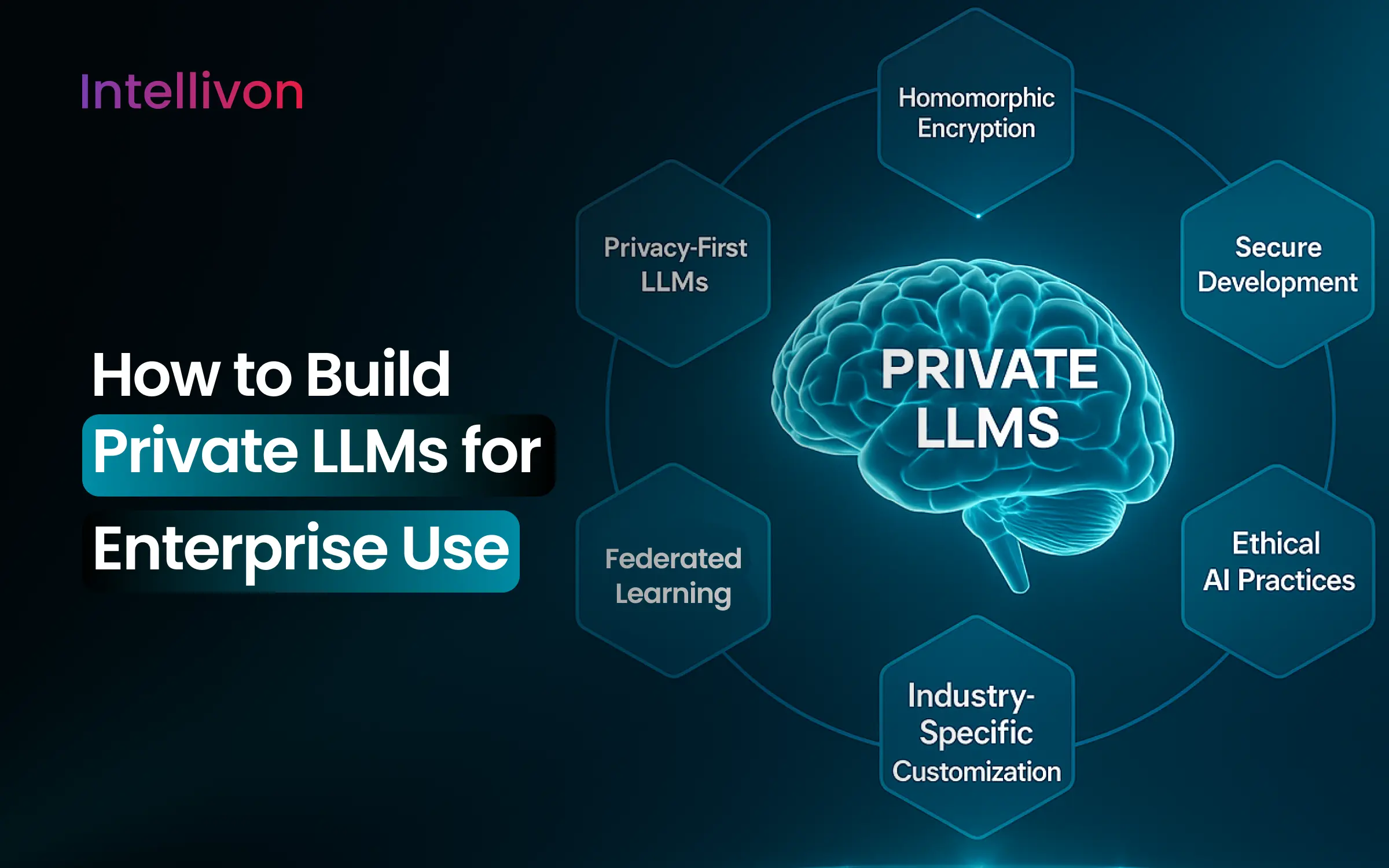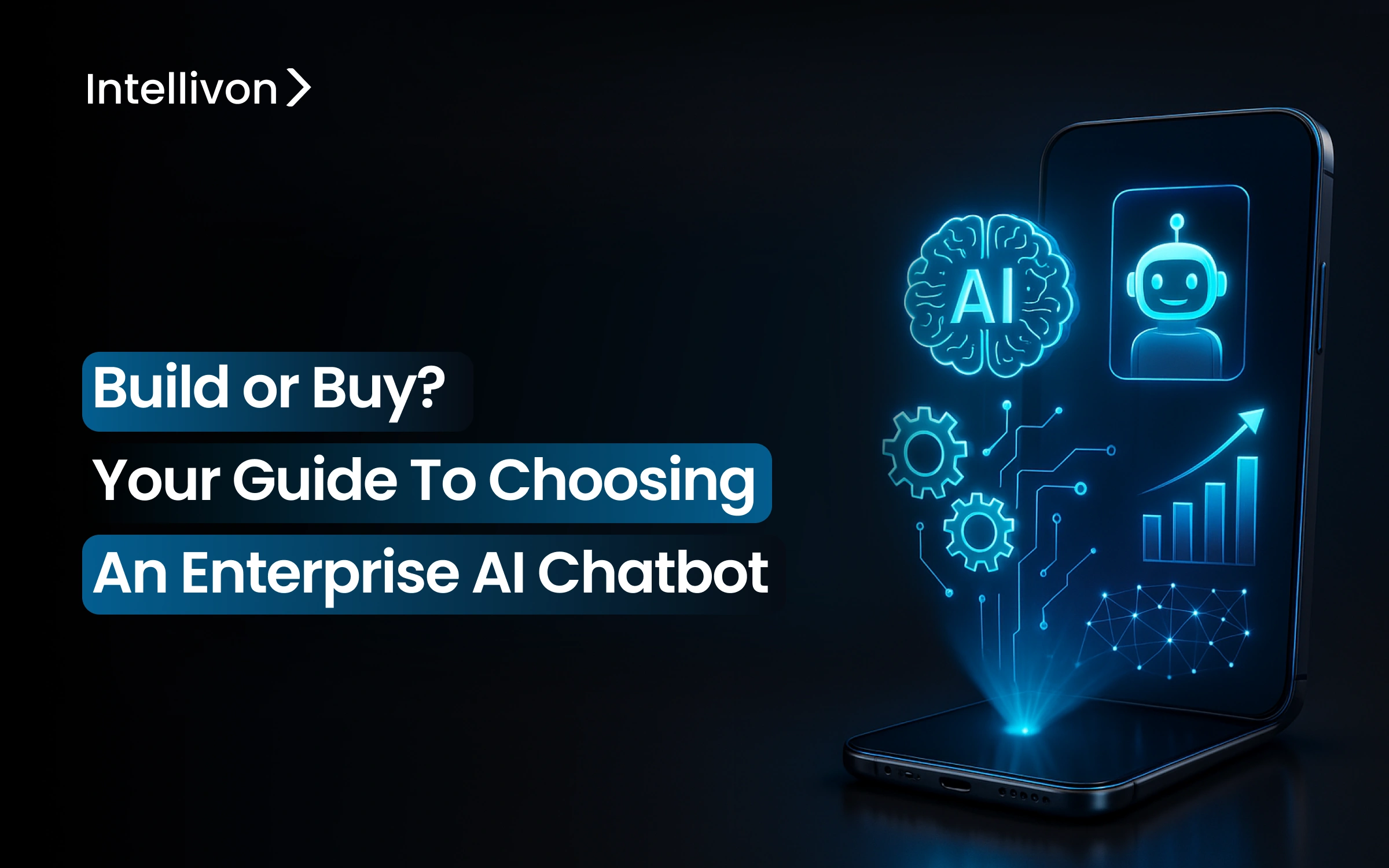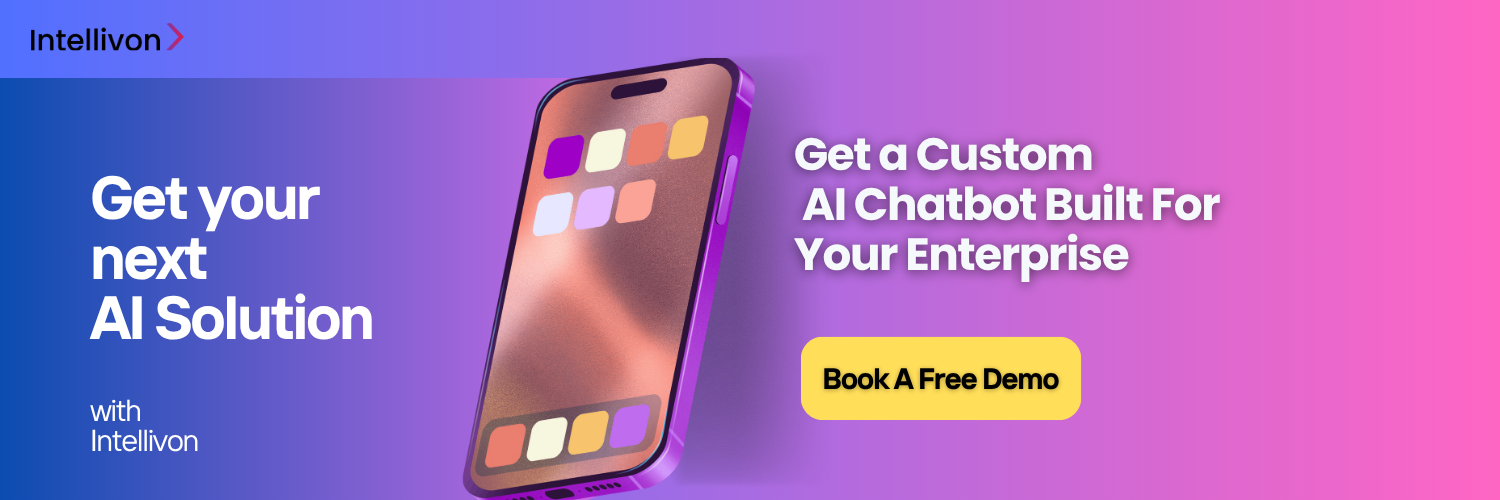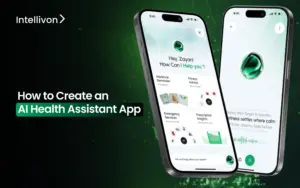Many enterprise leaders are finding themselves caught in a maze of options when it comes to choosing the right AI chatbot. With so many solutions available, it’s easy to feel paralyzed by choice. The allure of “quick deployment” with off-the-shelf solutions is tempting. However, what often goes unnoticed is the long-term strategic value. The wrong choice can end up costing enterprises millions in lost opportunities due to inefficiencies and missed growth potential.
For large enterprises, the stakes are high. A chatbot that doesn’t meet your specific needs can cause inefficiencies, missed opportunities, and a fragmented customer experience. While pre-built chatbots may seem like the fastest solution, they often lack the flexibility and scalability required for long-term success.
On the other hand, custom-built chatbots provide a tailored experience designed to scale with your enterprise’s unique goals. Custom AI chatbots deliver 140% ROI in the first year alone compared to off-the-shelf solutions. Building a chatbot tailored to your enterprise not only provides a competitive advantage but also ensures you avoid the pitfalls of one-size-fits-all tools. At Intellivon, we’ve helped enterprises scale exponentially with our cutting-edge AI chatbots, powered to grow and adapt to large enterprise needs. In this blog, we will show you why custom-built chatbots are a better fit for your enterprise needs and how we develop them from the ground up.
Comparison Between Buying and Building Enterprise AI Chatbots
When it comes to selecting the right AI chatbot solution for your enterprise, the decision between building a custom chatbot or buying an off-the-shelf product is a critical one. Each option comes with its own set of advantages and challenges. To help you make an informed decision, we’ve broken down the key factors to consider, comparing the benefits of both approaches.
1. Budget and Cost Considerations
One of the first things to consider when choosing between building or buying an enterprise AI chatbot is the cost.
- Buying an Off-the-Shelf Solution: Typically, purchasing an off-the-shelf chatbot comes with lower upfront costs. These solutions often have subscription pricing models, meaning you pay a recurring fee for access to the software. This model can be attractive to businesses with limited budgets, especially in the short term.
- Building a Custom Chatbot: On the other hand, building a custom chatbot requires a significantly higher initial investment. Developing a bespoke solution involves both a larger development budget and ongoing maintenance costs. However, the ROI for a tailored chatbot can be far greater in the long run, particularly when it aligns closely with business needs.
While off-the-shelf chatbots are more affordable initially, custom-built chatbots provide greater value over time through tailored features and more control.
2. Time to Market
Time is a crucial factor in today’s fast-paced business world. You may need to deploy an AI chatbot quickly to meet the growing demand of your customers.
- Buying an Off-the-Shelf Solution: If speed is a priority, buying a pre-built chatbot solution is your best bet. These solutions are ready to go, often deployable within days or weeks, meaning your business can start benefiting almost immediately.
- Building a Custom Chatbot: Building your own AI chatbot takes longer, typically several months. This extended timeline allows for deeper customization but delays the time it takes to see any real-world benefits.
In the short term, buying a solution is faster, but building offers more long-term value through a chatbot that grows with your business.
3. Customization and Specific Business Needs
Every enterprise is unique, and the ability to tailor an AI chatbot to your specific needs can be a deciding factor.
- Buying an Off-the-Shelf Solution: Pre-built solutions are often limited in terms of customization. While they may have essential features, they are generally not flexible enough to address complex, industry-specific requirements.
- Building a Custom Chatbot: One of the major advantages of building your own chatbot is the ability to customize it fully. A custom chatbot can be designed specifically for your business processes, ensuring seamless integration with existing systems and addressing unique challenges.
If your business has specific requirements and needs a highly tailored solution, building is often the better option.
4. Scalability and Future Growth
As your business grows, so too should your chatbot. It’s important to think about how well your chatbot can scale to meet increasing demands.
- Buying an Off-the-Shelf Solution: Many off-the-shelf chatbots come with limitations in scalability. While they work well for small to medium-sized enterprises, their performance may decline as your business expands, often requiring costly upgrades or additional features.
- Building a Custom Chatbot: Custom-built chatbots are designed with scalability in mind. You can ensure that the chatbot grows alongside your enterprise, evolving with your business needs and increasing customer expectations.
In this case, building provides the flexibility and scalability that buying may lack.
5. Technical Expertise and Resources
Building a chatbot from scratch is not a task to take lightly. It requires specialized expertise and resources.
- Buying an Off-the-Shelf Solution: Purchasing a ready-made chatbot solution typically involves minimal technical expertise. Your internal team does not need to worry about the intricacies of development, AI, or NLP. The vendor handles everything from deployment to maintenance.
- Building a Custom Chatbot: Developing a custom chatbot requires a dedicated team of developers, data scientists, and AI specialists. Additionally, ongoing maintenance and improvements fall to your internal team, which requires continuous technical expertise.
If you can access external developers, building offers far more control and flexibility. Intellivon is a leading AI Chatbot developer, with our AI engineers and architects pre-vetted from renowned global institutions, who have transformed enterprises through robust AI chatbots.
6. Integration with Existing Systems
Your chatbot must work seamlessly with your current systems, such as customer relationship management (CRM) tools, marketing platforms, and databases.
- Buying an Off-the-Shelf Solution: Off-the-shelf chatbots often come with limited integration capabilities. They may not integrate fully with your existing enterprise software, leading to a fragmented user experience and additional work to make the systems work together.
- Building a Custom Chatbot: A custom-built chatbot can be deeply integrated with your existing infrastructure. You can design it to sync perfectly with your CRM, ERP, and other business systems, offering a seamless experience for both employees and customers.
For enterprises with complex systems or specialized needs, building allows for a perfect fit.
7. Maintenance, Support, and Updates
Once your chatbot is deployed, ongoing support and maintenance will be required to ensure smooth operation.
- Buying an Off-the-Shelf Solution: Off-the-shelf solutions typically include vendor-led maintenance and regular updates. This can ease the operational burden, as you don’t have to worry about ongoing technical challenges.
- Building a Custom Chatbot: When you build a custom solution, the responsibility for maintenance, updates, and fixing issues falls to your internal team. This can be resource-intensive, but ensures that updates are tailored to your exact needs. However, at Intellivon, we provide post-deployment maintenance and ongoing monitoring services, ensuring that the chatbot we build for you scales with your growing enterprise needs.
If you prefer outsourcing maintenance, buying might be a better option. However, if you want more control, building offers long-term flexibility.
8. Security and Compliance
For industries such as healthcare, finance, and government, security and compliance are critical. Your chatbot must adhere to strict regulations and ensure data protection.
- Buying an Off-the-Shelf Solution: Pre-built solutions often follow general security standards but may not meet specific regulatory requirements, especially if your enterprise operates in a highly regulated industry.
- Building a Custom Chatbot: Building a chatbot from the ground up allows you to design security measures and compliance policies that fit your enterprise’s unique needs. This provides full control over data protection and regulatory adherence.
For enterprises with strict security and compliance needs, building a custom solution offers greater control.
This table provides a clear side-by-side comparison to help businesses weigh the pros and cons of buying vs. building an enterprise AI chatbot based on their unique needs.
| Factor | Buy (Off-the-Shelf) | Build (Custom) |
| Initial Investment | Lower upfront cost, subscription-based | Higher upfront cost, large development budget |
| Time to Market | Fast deployment (days to weeks) | Longer timeline (months) |
| Customization | Limited customization options | Fully customizable per unique needs |
| Scalability | Limited scalability, vendor dependent | Designed for scalability and future growth |
| Technical Expertise | Minimal in-house AI expertise needed | Requires skilled developers, data scientists |
| Integration | Limited integration capabilities | Deep integration with internal systems |
| Maintenance and Support | Vendor-led maintenance and updates | Full in-house maintenance responsibility |
| Security and Compliance | Vendor-dependent security standards | Full control over security and compliance |
| AI/NLP Capabilities | Established, tested technology | Potentially superior NLP with dedicated tuning |
| User Experience | Established UX, but less tailored | Tailored UX matching brand and user needs |
| Vendor Reputation | Must evaluate vendor reliability | Full control over development quality |
Why Off-the-Shelf Enterprise Chatbots Fail
Off-the-shelf enterprise AI chatbots often fall short when implemented at an enterprise level. While they may appear to be quick, cost-effective solutions, they frequently fail to meet the needs of large organizations. Here are six key reasons why these chatbots tend to fail in enterprise scenarios:
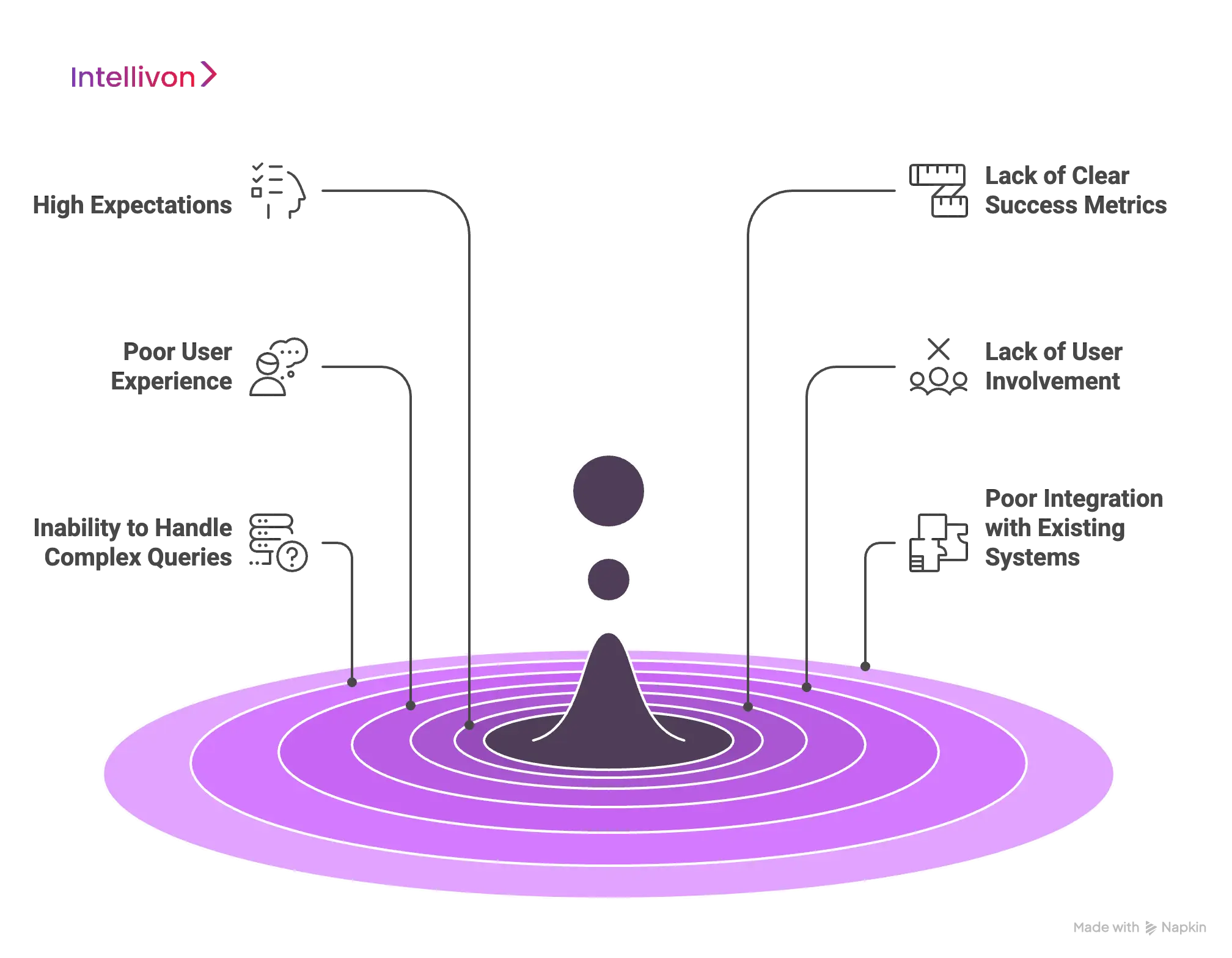
1. High Expectations
In many cases, enterprises expect too much from off-the-shelf chatbots right out of the gate. These solutions often aim to cover a broad range of tasks, leading to overload and failure during pilot stages. Off-the-shelf chatbots are typically not built to handle the complexity and scale of large enterprise environments. The pressure to perform at a high level across multiple departments or functions often results in underwhelming performance, leading to frustration and abandonment.
2. Lack of Clear Success Metrics
Off-the-shelf chatbots are often deployed without clear KPIs or defined goals. Enterprises frequently fail to establish meaningful metrics to measure chatbot performance, making it difficult to evaluate success or pinpoint areas for improvement. Without a clear set of measurable objectives, it becomes nearly impossible to assess whether the chatbot is delivering real value, resulting in a lack of accountability and wasted investment.
3. Poor User Experience
Enterprise users demand relevant, timely, and context-aware responses. However, off-the-shelf chatbots often fail to provide an intuitive user experience. These solutions frequently offer vague or irrelevant answers, which frustrate users and lead to disengagement. In large-scale environments, where every interaction matters, delivering an efficient and seamless user experience is essential. Off-the-shelf chatbots, with their generic designs, struggle to meet these expectations.
4. Lack of User Involvement
Enterprise-level deployments require continuous input from business users to ensure the chatbot remains relevant and useful. Off-the-shelf solutions, however, often do not facilitate ongoing business involvement or offer the flexibility needed for continuous improvement. Without regular content updates and adjustments, the chatbot quickly becomes outdated, leaving users with a tool that no longer aligns with evolving business needs. This lack of engagement and change management leads to poor adoption and eventual failure.
5. Inability to Handle Complex Queries
Enterprise environments typically deal with complex workflows and multi-step processes that off-the-shelf chatbots are not equipped to handle. These solutions often fail to escalate complex queries or transfer conversations to human agents with the necessary context. This results in a disjointed experience for users who expect the chatbot to understand and address more than just basic inquiries. The inability to seamlessly transition to human support or manage intricate queries limits the chatbot’s utility in high-demand enterprise settings.
6. Poor Integration with Existing Systems
Enterprise organizations rely heavily on internal systems such as CRMs, databases, and customer service platforms. Off-the-shelf chatbots often struggle to integrate seamlessly with these systems. Lack of integration leads to gaps in the chatbot’s ability to provide personalized or contextually relevant responses. Without access to real-time data or integrated workflows, these chatbots fall short in delivering the accuracy and utility that enterprise environments demand. The resulting inefficiencies can undermine the chatbot’s effectiveness, leaving it unable to meet the expectations of both customers and employees.
Why Building Custom Enterprise AI Chatbots Delivers Superior Results
Building a custom enterprise AI chatbot offers significant advantages over buying off-the-shelf solutions. Custom chatbots are designed to meet your business’s specific needs, deliver superior performance, and provide better long-term value. Here are six key reasons why custom-built chatbots outperform pre-built options for large enterprises:
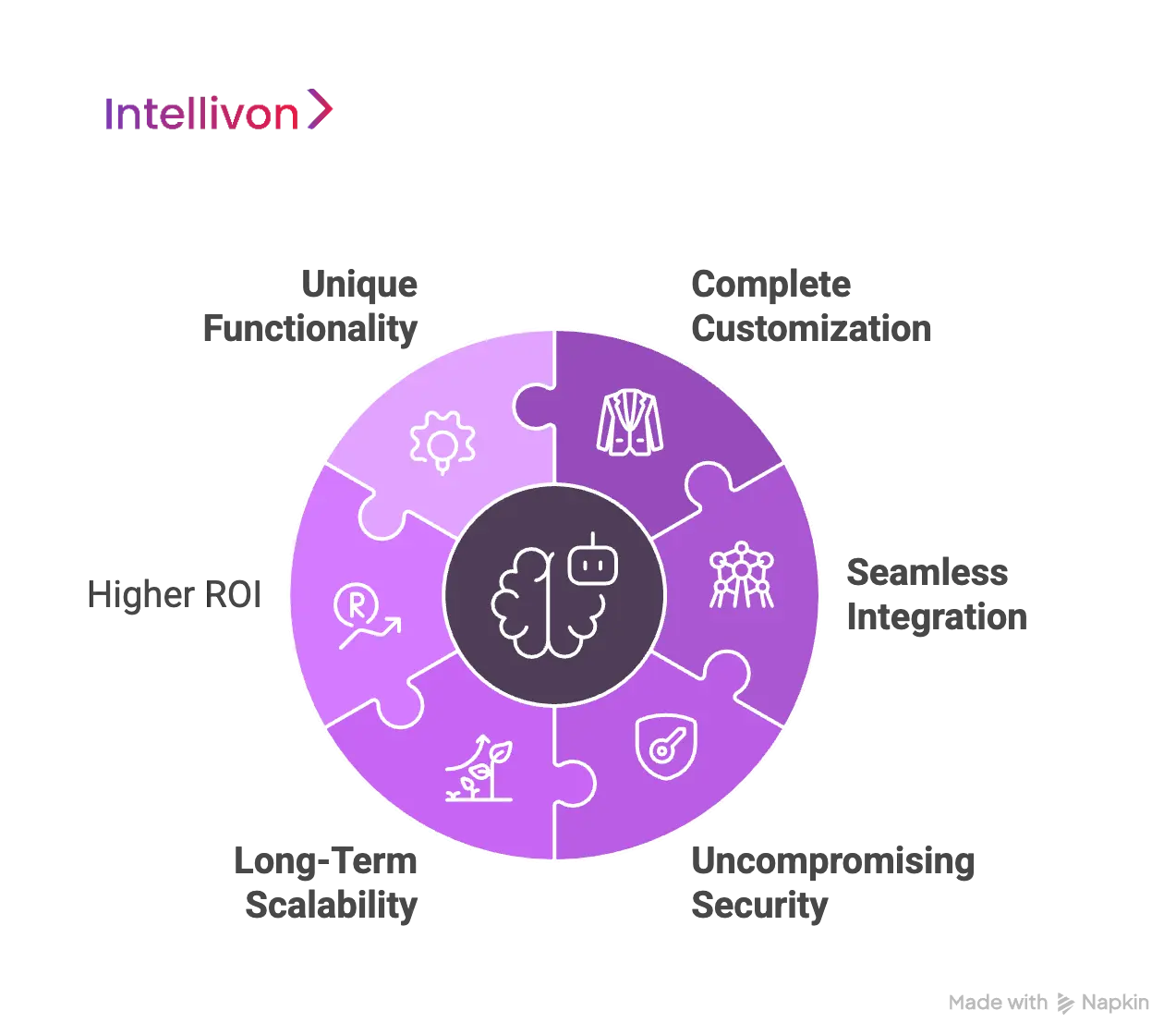
1. Complete Customization
A custom chatbot is built from the ground up to reflect your business’s unique brand personality. Unlike off-the-shelf solutions, a custom chatbot is trained on your specific data and understands your company’s terminology.
It can handle complex, industry-specific queries that generic chatbots simply can’t. This level of customization ensures a consistent and seamless brand experience, making every interaction with your customers feel personal and aligned with your values.
2. Seamless Integration
One of the biggest benefits of building a custom chatbot is its ability to integrate seamlessly with your existing CRM, ERP, and other critical business systems. Unlike pre-built solutions, custom chatbots are engineered to work within your enterprise environment.
This deep integration allows the chatbot to access real-time data, automate multi-step workflows, and eliminate the data silos that often arise when using off-the-shelf products. It ensures that the chatbot works efficiently within your current infrastructure, improving overall business operations.
3. Uncompromising Security
For enterprises handling sensitive data, security is non-negotiable. Building a custom AI chatbot gives you full control over security protocols and data governance.
You can design the chatbot to meet strict compliance standards like GDPR, HIPAA, or SOC 2 from day one. This approach mitigates risks associated with data privacy and ensures that the chatbot adheres to your company’s security policies. With a custom solution, your data stays within your control, reducing the chances of a security breach.
4. Long-Term Scalability
A custom-built chatbot is scalable and agile, allowing it to evolve with your business. Take VR Bank Südpfalz, for instance. The bank’s custom AI chatbot, AVA, saved €530,000 annually, improved service efficiency, and expanded without scaling the human team.
Unlike rigid, pre-packaged products, custom chatbots are designed with long-term growth in mind. As your business evolves, your chatbot can easily be updated or enhanced to incorporate new features, emerging technologies, or changes in your business strategy. This future-proofing ensures your chatbot stays relevant, avoiding the constraints of a vendor’s limited roadmap.
5. Higher ROI
Custom chatbots are tailored to automate your specific workflows and high-value tasks, leading to greater efficiency. Off-the-shelf solutions often fail to deliver the same level of automation because they are not designed for the unique processes of your business.
By automating routine or complex tasks, a custom chatbot reduces operational costs, allowing human resources to focus on more strategic initiatives. This increased efficiency ultimately leads to a higher ROI for your enterprise.
6. Unique Functionality
A custom chatbot allows you to build unique features that give your business a competitive advantage. Unlike off-the-shelf chatbots, which come with pre-defined functionalities, a custom solution enables you to create a chatbot that offers distinct services, solves specific industry problems, or enhances customer experience in a way your competitors can’t replicate.
This differentiation is crucial for standing out in a crowded market and offering value that your competitors can’t match. Custom-built enterprise AI chatbots deliver unmatched flexibility, security, and scalability compared to off-the-shelf solutions. For enterprises looking to gain a competitive edge and streamline operations, investing in a custom solution is the clear choice.
Real World Use Cases of Enterprises Using Custom AI Chatbots
1. Banking & Financial Services
In the banking and financial sector, custom AI chatbots are transforming customer service by automating routine tasks, streamlining loan and credit processes, and enhancing security with real-time fraud detection. These chatbots reduce operational costs and improve customer satisfaction by providing quick and accurate responses 24/7.
1. Account Management and Transaction Support
Chatbots help customers manage their accounts, track transactions, and perform simple banking activities without the need for human intervention.
2. Loan and Credit Application Processing
AI chatbots guide customers through the loan application process, verify data, and assist in submitting necessary documentation.
3. Fraud Prevention and Customer Alerts
Chatbots provide real-time fraud detection, alerting customers to suspicious activity or potential threats, and improving security.
Example: Discover Financial (Discover Virtual Assistant)
Discover Financial uses its custom chatbot, Discover Virtual Assistant, to help customers manage their accounts and handle personalized queries. The chatbot has significantly improved service efficiency, reduced costs, and enhanced compliance by automating routine interactions, allowing human agents to focus on more complex issues.
2. Healthcare
Custom AI chatbots in healthcare streamline patient engagement by managing appointment bookings, assisting with health triage, and providing medication reminders. These chatbots reduce administrative burdens, improving both patient outcomes and healthcare staff efficiency.
1. Appointment Booking and Reminders
Chatbots automate appointment scheduling, send reminders, and manage cancellations, reducing administrative workload and improving patient attendance.
2. Health Triage and Symptom Checking
AI chatbots assess symptoms and guide patients toward the appropriate care, whether it’s self-care or seeking medical attention.
3. Medication Adherence Support
Chatbots help patients remember to take their medications on time, providing regular reminders to ensure adherence.
Example: Regional Clinic WhatsApp Bot
The Regional Clinic WhatsApp Bot has helped reduce no-show appointments by 20% and cut phone traffic by 50%. This allows clinical staff to focus on higher-value tasks, improving overall clinic efficiency and patient experience.
3. Retail & eCommerce
In the retail and eCommerce industries, custom chatbots enhance the shopping experience by handling order tracking, providing personalized product recommendations, and streamlining returns processing. These bots increase customer engagement while easing the support workload.
1. Real-Time Order Tracking and Returns
Chatbots provide real-time updates on order statuses and help customers initiate returns or exchanges, improving the post-purchase experience.
2. Personalized Shopping Assistance
AI chatbots analyze customer preferences to offer tailored product recommendations, improving conversion rates and customer satisfaction.
3. Customer Feedback and Surveys
Retail chatbots gather customer feedback and conduct surveys, helping businesses understand customer sentiment and improve services.
Example: Klarna Freshchat Integration
Klarna’s Freshchat Integration drastically reduced user wait times to just 60 seconds and increased chat volume capacity. The chatbot improved customer satisfaction and helped Klarna handle high volumes of customer interactions more efficiently.
4. Travel & Hospitality
Chatbots in the travel and hospitality industries help streamline booking processes, provide real-time travel updates, and assist with customer support, improving the guest experience and reducing operational costs.
1. Reservation and Itinerary Management
AI chatbots handle booking, cancellations, and changes to travel itineraries, offering a seamless experience for guests.
2. Travel Advisory and Visa Information
Chatbots provide up-to-date travel advice, including visa information, customs regulations, and health requirements for travelers.
3. Real-Time Service Requests and Upselling
Chatbots facilitate real-time service requests and upsell additional services like excursions, upgrades, or special amenities.
Example: Hyatt Hotels Digital Concierge
Hyatt Hotels Digital Concierge assists guests with personalized booking, local recommendations, and real-time service requests. This chatbot has significantly enhanced guest satisfaction by offering seamless, personalized assistance throughout the stay.
5. Human Resources
In Human Resources (HR), AI chatbots streamline recruitment, automate internal queries, and assist with employee onboarding. By reducing manual tasks, HR teams can focus on more strategic activities, improving overall efficiency.
1. Recruitment Candidate Screening
Chatbots automate the screening process by reviewing resumes, conducting initial interviews, and shortlisting candidates for further assessment.
2. Employee FAQ and Policy Guidance
AI bots answer employee questions about company policies, benefits, and procedures, reducing HR workload.
3. Onboarding Assistance
Chatbots guide new employees through the onboarding process, providing them with necessary documents and introducing them to company culture.
Example: Unilever AI Recruiter Bot
Unilever’s AI Recruiter Bot streamlines candidate screening and scheduling, reducing the recruitment cycle time. This has improved the candidate experience while allowing the HR team to focus on higher-priority tasks.
6. Telecommunications
In telecommunications, AI chatbots automate customer support, manage billing queries, and help with service upgrades. This reduces call center volumes and improves first-contact resolution rates.
1. Billing and Account Support
Chatbots handle billing inquiries, payment processing, and account management, reducing the need for human agents.
2. Plan Upgrades and Renewals
Telecom chatbots assist customers with upgrading their plans, renewing contracts, and exploring new service options.
3. Network Outage Reporting
AI chatbots provide real-time information on network outages and help customers troubleshoot issues.
Example: Vodafone TOBi Chatbot
Vodafone’s TOBi Chatbot handles millions of interactions each month, resolving customer issues quickly and driving digital self-service adoption. This chatbot improves customer satisfaction by providing instant support while reducing call center demands.
These real-world examples highlight how custom AI chatbots can dramatically improve operational efficiency, customer service, and business outcomes across various industries. Whether it’s banking, healthcare, or retail, custom chatbots offer tailored solutions that meet the unique needs of each enterprise.
Essential Features We Ensure Our Enterprise AI Chatbot Must Have
When building a custom AI chatbot for large-scale enterprises, it’s crucial that the solution is more than just a conversational tool. It must be a strategic asset designed to provide performance, security, and scalability. Here are the key features we ensure are integrated into every enterprise AI chatbot we build.
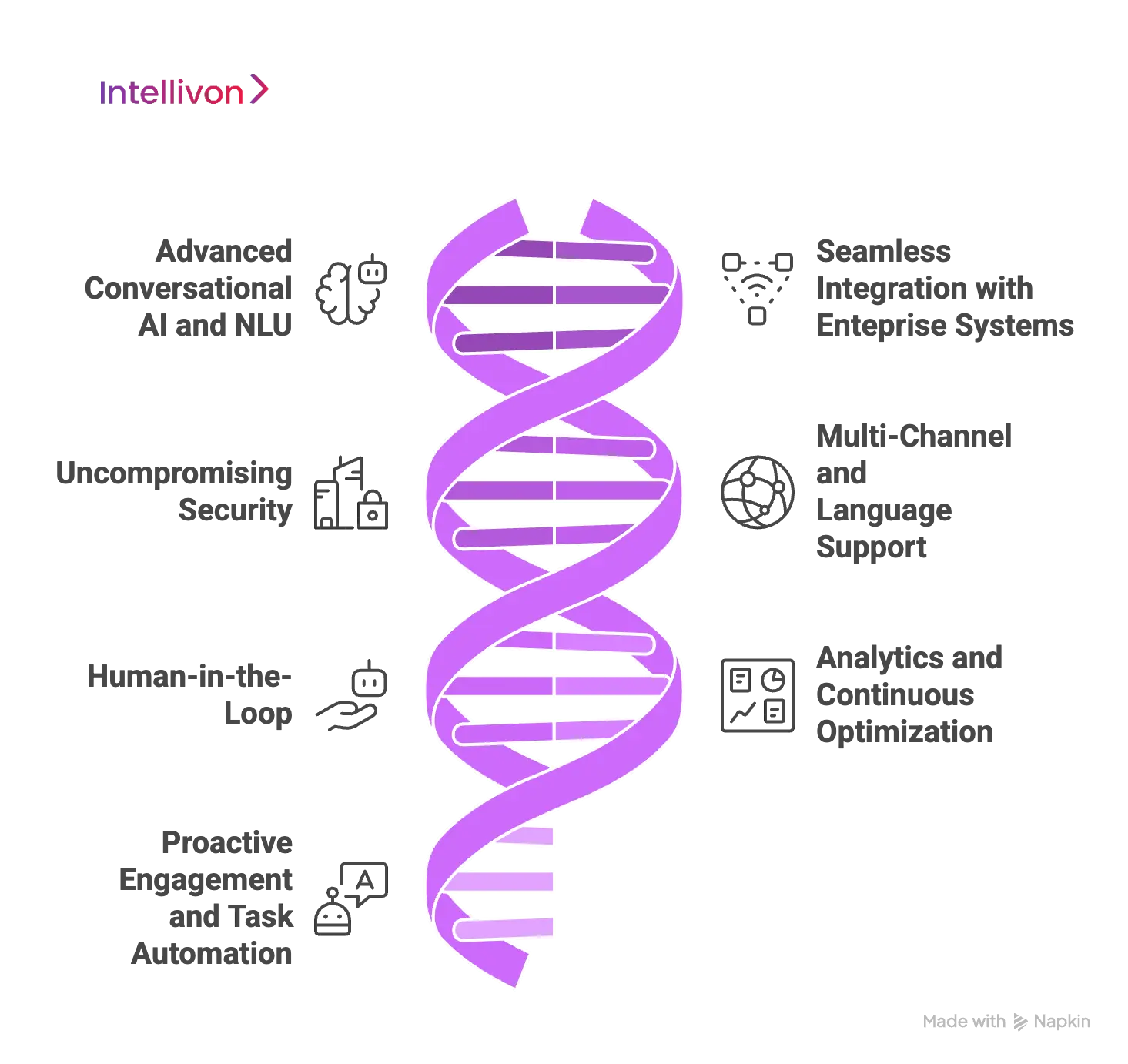
1. Advanced Conversational AI and NLU
The foundation of any high-performing AI chatbot lies in its ability to understand user intent, context, and sentiment. A chatbot must go beyond simple keyword matching to handle complex, multi-turn conversations effectively. It should be able to interpret industry-specific terminology, jargon, and acronyms.
With an advanced NLU (Natural Language Understanding) engine, the chatbot delivers a smart, intuitive user experience, enhancing engagement and satisfaction.
2. Seamless Integration with Enterprise Systems
A custom chatbot’s true value comes from its ability to connect seamlessly with your existing tech stack. Our solutions are built to integrate deeply with your CRM, ERP, and other essential systems.
This ensures the chatbot can access and update real-time data, enabling it to provide personalized responses and automate workflows across your organization. The result? A more efficient, streamlined operation with less manual intervention.
3. Uncompromising Security
For enterprises handling sensitive data, security is non-negotiable. Our chatbots are designed with enterprise-grade security protocols from the start. We ensure they comply with the highest industry standards like GDPR, HIPAA, and SOC 2.
This provides complete control over your data, ensuring privacy and compliance. With our custom chatbots, your organization can be confident in its data protection measures.
4. Multi-Channel and Language Support
To reach a global audience, the chatbot must be able to operate across multiple communication channels. Our custom chatbots are deployable on websites, mobile apps, and messaging platforms like Slack or Microsoft Teams. Additionally, to cater to a diverse user base, the chatbot is designed to support multiple languages.
This ensures a consistent, localized experience that caters to users worldwide, regardless of language or platform.
5. Human-in-the-Loop
While automation is powerful, certain issues require a human touch. Our custom AI chatbots are designed with an intelligent handoff mechanism, identifying when a query is too complex or sensitive.
When needed, the chatbot can smoothly transfer the conversation to a live agent, ensuring the agent receives the full chat history for a seamless transition. This ensures the best possible experience for users while maintaining operational efficiency.
6. Analytics and Continuous Optimization
A data-rich enterprise chatbot is a valuable tool for businesses. We equip our chatbots with robust analytics dashboards that track key metrics like user engagement, conversation success rates, and popular queries. T
his data helps businesses monitor chatbot performance and uncover areas for improvement. With continuous optimization, the chatbot becomes more effective over time, driving better business outcomes.
7. Proactive Engagement and Task Automation
A chatbot should proactively assist users. Our solutions are designed to initiate conversations, send personalized notifications (such as shipping updates or password reset links), and automate repetitive tasks.
This proactive engagement turns the chatbot from a passive support tool into an active business-driving assistant, improving both user satisfaction and operational efficiency.
With advanced capabilities like conversational AI, seamless integration, and uncompromising security, Intellivon’s chatbots help large-scale businesses provide better service, improve efficiency, and scale operations.
How We Build AI Chatbots for Enterprises: Step-By-Step Process
At Intellivon, we specialize in building custom AI chatbots designed specifically for enterprise-level needs. Our process is thorough and structured, ensuring that every chatbot we develop is secure, scalable, and efficient. Here’s how we build AI chatbots that drive business success:
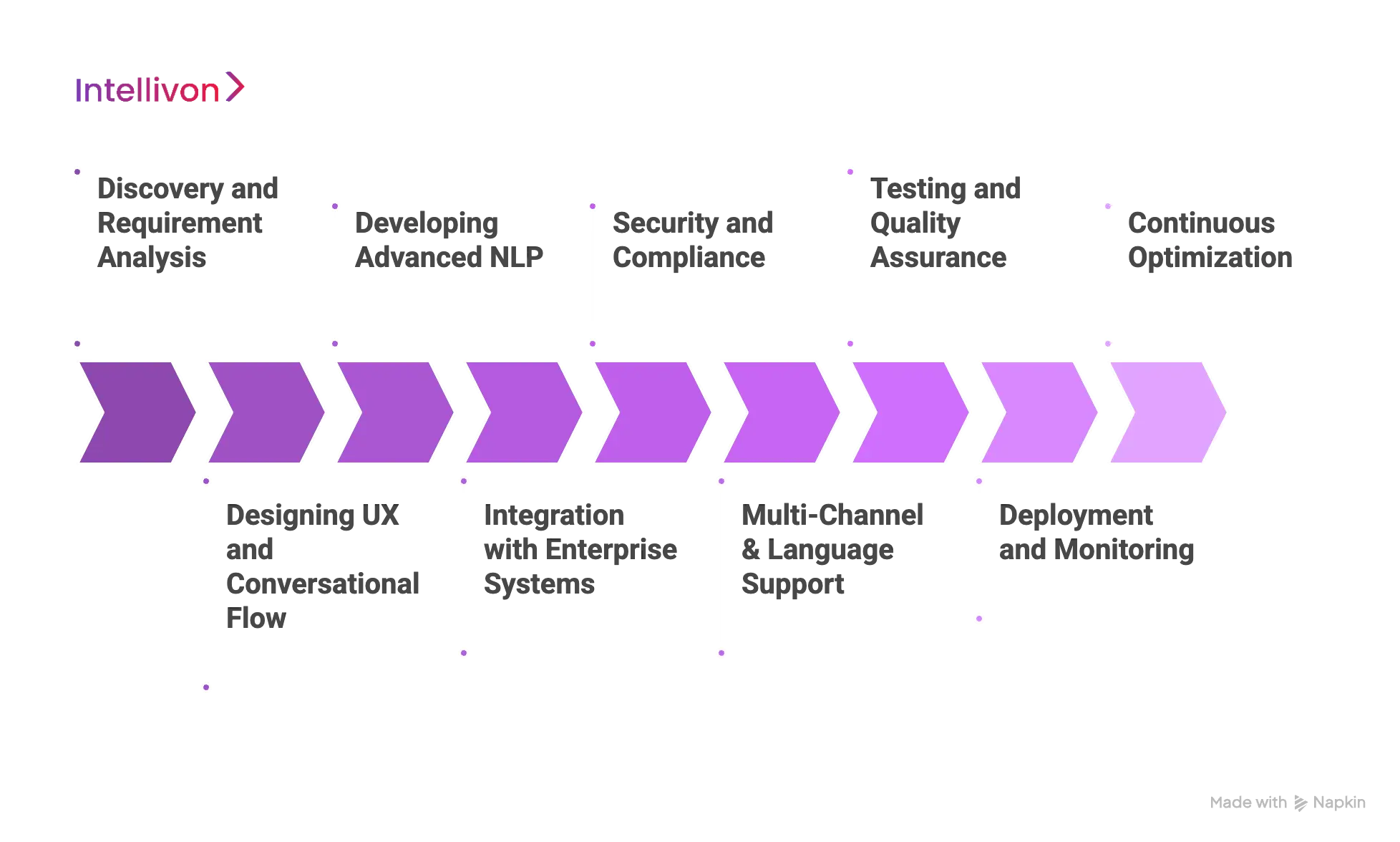
1. Discovery and Requirement Analysis
The first step in building a custom enterprise AI chatbot is to fully understand your business. We work closely with key stakeholders to define the chatbot’s objectives, identify core use cases, and analyze your existing systems (like CRM, ERP, or other tools). This step ensures we create a solution that aligns with your business’s unique needs and goals, setting a strong foundation for the entire project.
2. Designing UX and Conversational Flow
Once we understand your business, we focus on designing the user experience (UX) and conversational flow. We create an intuitive, engaging interface, ensuring that interactions with the chatbot feel natural and seamless.
The chatbot’s ability to handle both simple and complex user requests is carefully crafted, ensuring a frictionless experience that reduces customer effort and increases satisfaction.
3. Developing Advanced NLP
The next step is to implement NLP, a key component for intelligent conversations. At Intellivon, we develop advanced NLP algorithms that go beyond basic keyword matching.
Our chatbots understand user intent, context, and sentiment, enabling them to manage multi-turn conversations and interpret industry-specific terms accurately. This ensures that the chatbot can handle complex queries, a critical feature for enterprise use.
4. Integration with Enterprise Systems
A custom chatbot’s true value comes from its ability to integrate seamlessly with existing enterprise systems. We ensure our chatbots are deeply integrated with your CRM, ERP, and other business tools.
This allows the chatbot to pull and update real-time data, enabling personalized interactions and automated workflows. Seamless integration is key to ensuring the chatbot operates smoothly across your entire organization.
5. Security and Compliance
At Intellivon, we prioritize security and data sovereignty. Our custom chatbots are built with enterprise-grade security protocols from the ground up, ensuring compliance with relevant standards like GDPR, HIPAA, and SOC 2.
We provide complete control over your data, ensuring its security, privacy, and compliance with industry regulations.
6. Multi-Channel & Language Support
To reach a diverse, global audience, our chatbots are designed to operate across multiple communication channels, including websites, mobile apps, and messaging platforms like Slack or Microsoft Teams. Additionally, our solutions support multiple languages, allowing enterprises to deliver a consistent experience to users across different regions and languages, improving global engagement.
7. Testing and Quality Assurance
Before deployment, we rigorously test the chatbot to ensure it meets all performance standards. Our team conducts thorough user acceptance testing (UAT), stress tests, and security audits to ensure the chatbot operates reliably at scale. We also make adjustments based on feedback to guarantee optimal performance, ensuring that the chatbot performs under real-world conditions.
8. Deployment and Monitoring
Once the chatbot is tested and approved, we deploy it across your chosen platforms. Post-deployment, Intellivon provides continuous monitoring to track KPIs, such as user engagement and conversation success rates. We ensure that the chatbot is performing as expected and meeting business objectives.
9. Continuous Optimization
Our work doesn’t stop after deployment. We continuously optimize the chatbot’s performance based on real-time analytics and user feedback. Through ongoing updates and machine learning tuning, the chatbot evolves to better serve your business needs. This ensures that the chatbot remains effective and aligned with your company’s evolving goals.
We follow a comprehensive, enterprise-focused approach to chatbot development. From the initial discovery phase to continuous optimization, our team ensures that your custom AI chatbot is a strategic asset designed to meet the specific needs of your business.
Cost of Building a Custom AI Chatbot for Your Enterprise
This cost sheet covers the comprehensive stages of developing and deploying a custom AI chatbot, from initial planning through continuous optimization. The final cost will depend on factors like features, integration complexity, and maintenance needs.
| Cost Component | Estimated Cost Range | Description |
| 1. Discovery and Requirements Gathering | $5,000 – $10,000 | Initial phase where business needs, use cases, and key stakeholder requirements are gathered. |
| 2. User Experience (UX) Design & Conversational Flow | $10,000 – $15,000 | Designing the chatbot’s interface and defining the conversational flow, including prototypes. |
| 3. Natural Language Processing (NLP) & AI Model Training | $15,000 – $20,000 | Building and training NLP models to understand user intent, context, and sentiment for complex queries. |
| 4. Backend Development and Integration | $10,000 – $20,000 | Integrating the chatbot with enterprise systems (CRM, ERP, etc.) to access and update real-time data. |
| 5. Security & Compliance Implementation | $5,000 – $10,000 | Implementing security protocols (GDPR, HIPAA) and ensuring the chatbot meets regulatory standards. |
| 6. Multi-Channel and Multi-Language Support | $5,000 – $10,000 | Adding capabilities for the chatbot to operate on multiple platforms (web, mobile, messaging apps) and support multiple languages. |
| 7. Testing & Quality Assurance | $5,000 – $10,000 | Extensive testing to ensure functionality, security, and scalability, including bug fixes. |
| 8. Deployment and Monitoring | $5,000 – $10,000 | Deploying the chatbot to live environments and monitoring performance, collecting user feedback. |
| 9. Continuous Optimization & Updates | $5,000 – $10,000 (per year) | Ongoing improvements, updates, and machine learning model training based on feedback and analytics. |
Total Estimated Cost:
$50,000 – $100,000 (depending on the complexity, scope, and specific requirements of your enterprise).
This is an estimation of the cost required to build an enterprise-level AI chatbot. If you need a full, free quote tailored to your enterprise-specific needs, consult Intellivon’s AI experts.
Best Practices We Employ to Implement Enterprise AI Chatbots
At Intellivon, we understand that implementing a custom AI chatbot for an enterprise is a strategic decision that requires careful planning, execution, and ongoing optimization. To ensure successful deployment and high user adoption, we follow a set of best practices tailored to meet the unique needs of large-scale businesses. Below are the best practices we employ to ensure the chatbot delivers maximum value.
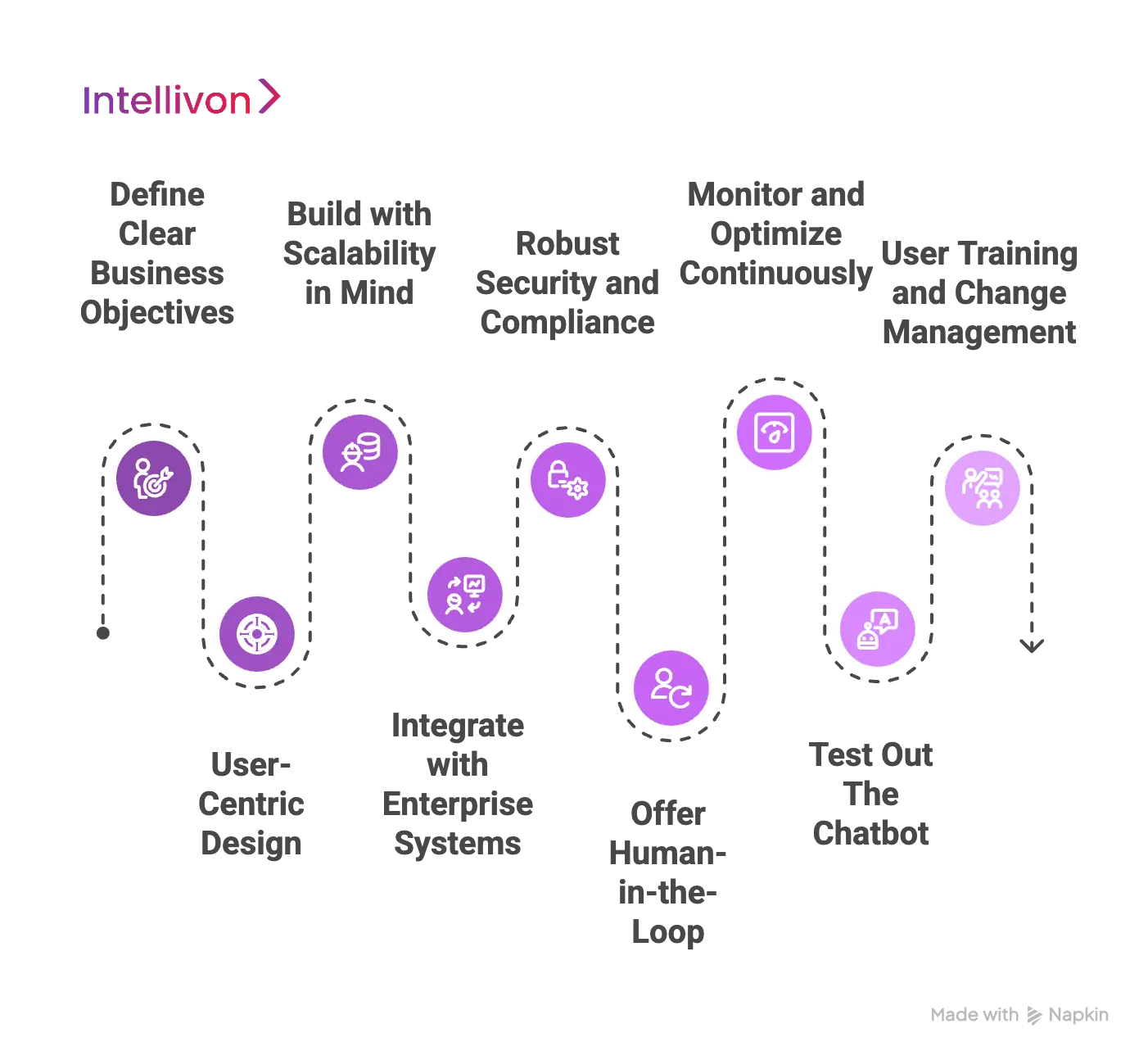
1. Define Clear Business Objectives
Before any development begins, it’s crucial to align the chatbot’s objectives with your enterprise’s overall business strategy. We work closely with stakeholders to define KPIs and ensure the chatbot addresses specific pain points, such as customer service automation, sales support, or internal employee assistance.
This alignment ensures that the chatbot is a strategic asset, not just a tool, helping to improve operational efficiency and drive measurable business outcomes.
2. User-Centric Design
We prioritize UX in the design and implementation of our enterprise AI chatbots. An intuitive and efficient user experience is critical for ensuring high adoption rates and user satisfaction.
Our team designs simple, clear, and easy-to-navigate conversational flows that cater to the diverse needs of your customer or employee base. By using NLU and contextual awareness, we ensure that the chatbot can handle complex queries and offer personalized, relevant responses.
3. Build with Scalability in Mind
Enterprise AI chatbots need to grow as your business evolves. To that end, we design and build chatbots that are scalable, capable of handling increasing volumes of users and data as your enterprise expands. We ensure the underlying architecture is flexible and future-proof, allowing the chatbot to evolve with new features, technologies, and integrations.
This scalability is essential for enterprises that aim to maintain high-quality interactions as customer demands change and the business grows.
4. Integrate with Enterprise Systems
One of the key differentiators of a custom enterprise chatbot is its ability to integrate with your existing tech stack. At Intellivon, we focus on building deep integrations with CRM systems (e.g., Salesforce), ERP platforms, and other critical business tools.
This integration allows the chatbot to access and update real-time data, enabling personalized interactions and efficient task automation. Whether it’s retrieving customer records, processing orders, or managing workflows, a seamless integration ensures the chatbot adds real value to your business operations.
5. Robust Security and Compliance
Enterprises handle large volumes of sensitive data, so ensuring the security and compliance of the chatbot is critical. We adhere to enterprise-grade security protocols and ensure compliance with regulations like GDPR, HIPAA, and SOC 2.
Our custom chatbots are designed with strong encryption, authentication mechanisms, and data governance policies to protect both customer and business data. By building security into the core architecture, we mitigate risks and ensure that the chatbot adheres to the strictest privacy standards.
6. Offer Human-in-the-Loop
While chatbots are excellent for automating routine queries, we recognize that some issues require human intervention. To ensure a seamless customer experience, we design chatbots with a human-in-the-loop feature that allows for easy escalation to a live agent when necessary.
The chatbot intelligently identifies when a query is too complex or sensitive to handle and smoothly transfers the conversation to a human, ensuring full context is retained. This feature helps maintain a high standard of service, even for complicated or high-stakes inquiries.
7. Monitor and Optimize Continuously
Post-deployment, the work isn’t finished. To ensure ongoing success, we monitor the chatbot’s performance through detailed analytics dashboards that track key metrics, including engagement, conversation success rates, and user satisfaction.
We use this data to fine-tune the chatbot’s performance, optimize its responses, and improve the overall user experience. Continuous optimization allows the chatbot to learn from real-time interactions and become more effective over time, ensuring it continues to meet evolving business needs.
8. Test Out The Chatbot
Before launching any chatbot, thorough testing is essential. We conduct multiple rounds of user acceptance testing (UAT), security testing, and stress testing to ensure that the chatbot performs well under real-world conditions.
Testing is done across all supported platforms and devices to identify potential issues and resolve them before the chatbot goes live. This minimizes the risk of failure and ensures a smooth user experience from day one.
9. User Training and Change Management
Even the best AI chatbot will struggle if end-users aren’t fully on board. To ensure successful adoption, we provide comprehensive training to both end-users and internal teams. This training includes familiarizing them with the chatbot’s features, its integration with other tools, and how to escalate issues when necessary.
We also implement change management practices, ensuring that employees and customers understand the value the chatbot brings and are comfortable interacting with it.
By following these best practices, we ensure that each chatbot we deliver is tailored to meet the unique needs of large-scale enterprises. From user-centric design and seamless integration to continuous optimization and robust security, we build chatbots that are not only high-performing but also scalable, secure, and future-ready.
Conclusion
In conclusion, custom AI chatbots provide enterprises with tailored solutions that address key challenges, from seamless integrations and robust security to scalability and continuous optimization. Enterprises willing to scale their business and stay ahead of the competitive curve should get their AI chatbots custom-built rather than purchase off-the-shelf solutions.
By focusing on user-centric design and leveraging advanced technology, businesses can enhance operational efficiency, improve customer experience, and scale as their needs evolve. A well-implemented chatbot becomes a strategic asset, driving long-term value and ensuring sustained success across all levels of the organization.
Ready to Transform Your Enterprise with Custom AI Chatbots?
With over 11 years of experience in enterprise AI and 500+ successful deployments across various industries, we are your trusted partner in building secure, scalable, and intelligent AI chatbots. We go beyond generic chatbot solutions, ensuring that your enterprise chatbot is fully integrated, secure, and tailored to meet your unique business needs.
What Sets Us Apart?
Tailored AI Solutions: We design chatbots specifically for your enterprise, ensuring they align with your business processes, goals, and industry requirements.
Seamless Integration: Our chatbots integrate seamlessly with your existing CRM, ERP, and backend systems to ensure a smooth user experience and enhance operational efficiency.
Enterprise-Grade Security: We prioritize your data security with end-to-end encryption, compliance with industry standards like GDPR and HIPAA, and robust data governance to meet your enterprise’s regulatory needs.
Scalability and Flexibility: Whether you’re handling a high volume of customer inquiries or internal processes, our chatbots scale with your business needs, adapting to evolving requirements without sacrificing performance.
Continuous Optimization: We don’t just deploy chatbots—we continuously monitor and optimize them, ensuring they stay up-to-date with your business and technological advancements.
Our Expert Team Will Provide:
- A comprehensive analysis of your AI strategy and goals
- Tailored use cases that align with your enterprise’s needs and ROI
- A deployment roadmap customized for your business environment and tech stack
- Scalable, secure chatbot architecture to support your enterprise growth
- Continuous performance monitoring and updates to optimize outcomes
Book your free strategy call today and start building a chatbot solution that will elevate your enterprise, enhance customer experience, and streamline operations for the future.
FAQ’s
1. How does an enterprise AI chatbot improve customer service?
Enterprise AI chatbots enhance customer service by providing instant responses, automating routine queries, and offering personalized interactions. They can handle multiple customer inquiries simultaneously, reducing wait times and ensuring a consistent experience across various channels.
2. What are the main benefits of building a custom AI chatbot?
Building a custom AI chatbot ensures full customization, seamless system integration, and greater scalability tailored to your business’s unique needs. It also provides better data security and industry-specific performance, which are often lacking in off-the-shelf solutions.
3. How do AI chatbots integrate with existing enterprise systems?
AI chatbots integrate with CRM, ERP, and other enterprise systems by accessing real-time data, automating workflows, and updating records. This deep integration ensures the chatbot enhances efficiency, personalizes interactions, and automates critical business processes.
4. Are enterprise AI chatbots secure for handling sensitive data?
Yes, enterprise AI chatbots are designed with advanced security protocols such as end-to-end encryption, user authentication, and data compliance standards (e.g., GDPR, HIPAA). This ensures that customer and business data remain protected while adhering to regulatory requirements.
5. How can a custom AI chatbot be optimized over time?
A custom AI chatbot is continuously optimized using real-time analytics, user feedback, and machine learning. By monitoring key metrics like engagement rates and response accuracy, the chatbot can evolve to improve performance, adapt to new business needs, and refine its conversational abilities.

